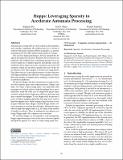Hopps: Leveraging Sparsity to Accelerate Automata Processing
Author(s)
Du, Xingran; Emer, Joel; Sanchez, Daniel
Download3676642.3736126.pdf (1.157Mb)
Publisher with Creative Commons License
Publisher with Creative Commons License
Creative Commons Attribution
Terms of use
Metadata
Show full item recordAbstract
Automata processing (AP) is a key kernel in data analytics and scientific computing. AP workloads process a stream of symbols with many automata (FSMs) in parallel, e.g., pattern-matching network traffic against many malicious strings.
The need for high-performance AP has sparked the design of specialized accelerators. But prior AP accelerators are inefficient: AP workloads have substantial sparsity, but accelerators exploit no or limited sparsity. Specifically, each AP workload can be expressed as the concurrent traversal of all automata, which are encoded as graphs. But state-of-the-art accelerators store these graphs uncompressed, using bitsets. This allows the use of specialized memory crossbars that provide high parallelism and efficiency when graphs are dense. But many graphs are highly sparse, making crossbar-based accelerators inefficient.
We present Hopps, the first automata processing accelerator that exploits sparse data representations. Hopps combines two types of processing units: one represents data uncompressed, which achieves high throughput but is space-inefficient, while the other uses a compressed-sparse representation, which achieves high space efficiency but lower and more variable throughput. To use Hopps well, we present a novel automata mapping algorithm that maps most work to high-throughput units, while keeping a large fraction of state in space-efficient units. Hopps's hybrid design relaxes several constraints in crossbar-based designs, allowing for more efficient high-throughput units (e.g., by using a large number of smaller crossbars). Thus, by making the uncommon case cheap, Hopps makes the common case even faster.
We evaluate Hopps on AutomataZoo benchmarks. Hopps outperforms prior state-of-the-art accelerators Impala and SpAP by gmean 2.5x and 2.2x when using equal area.
Description
ASPLOS ’25, Rotterdam, Netherlands
Date issued
2025-08-06Department
Massachusetts Institute of Technology. Computer Science and Artificial Intelligence LaboratoryPublisher
ACM|Proceedings of the 30th ACM International Conference on Architectural Support for Programming Languages and Operating Systems, Volume 3
Citation
Xingran Du, Joel S. Emer, and Daniel Sanchez. 2025. Hopps: Leveraging Sparsity to Accelerate Automata Processing. In Proceedings of the 30th ACM International Conference on Architectural Support for Programming Languages and Operating Systems, Volume 3 (ASPLOS '25). Association for Computing Machinery, New York, NY, USA, 96–111.
Version: Final published version
ISBN
979-8-4007-1080-3